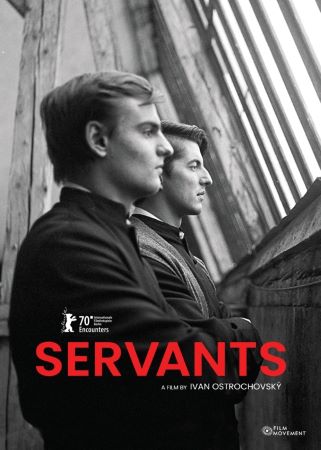
Servants 2020
Distributed by Film Movement
Produced by Albert Malinovsky
Directed by Ivan Ostrochovský
Streaming, 81 mins
College - General Adult
Catholicism; Soviet History
Date Entered: 10/12/2022
Reviewed by Cori Biddle, Student Engagement and Outreach Librarian, Robert E Eiche Library, Penn State AltoonaServants is a moody, atmospheric reflection on the consequences of living under the hyper-restrictive communist regime of 1970/80s Czechoslovakia. The film focuses on the tensions between a catholic seminary and state investigators constantly monitoring the actions of its faculty and students. But the tensions between characters, their personal choices, and moral obligations can be a mirror to the larger societal struggles during the time. The seminary’s students are largely portrayed as idealistic, while the faculty are pragmatic and callus in their desire to save the seminary at the cost of the individual students who are seen as potential “problems” to the state.
The overall plot, and story progression, may be difficult for students to follow, as the story is almost more in what is not said, then in what is. The tension in the film comes from the relationship between two new students, Juraj and Michal. They are friends who arrive at the seminary together, at a time of heightened scrutiny. Throughout the film they make choices, and keep secrets, that bring each of them to the attention of the dean of the seminary, and the state investigators. The conclusion of the film may not be satisfactory to many viewers but achieves its overall aim of not only telling the story but immersing the audience in the experience of living through that time period.
Because of its sparse dialogue and lack of explicit context, viewers may benefit from a primer on the basic history of communist rule in the former Czechoslovakia and the precarious status of the Church within that regime and in other states of the Soviet Bloc. For example, Radio Free Europe is a strong thread throughout the film for which some students may not have a reference. Though its portrayal of totalitarian governments, and the risk to resisters, can be easily applicable to any discussion of such society.
Though the cinematography in the film is striking, the audio quality of the film varied between scenes, making it hard to hear some of the dialogue on the version submitted for review. Though, most viewers will need subtitles regardless.
The more mature nature of the film means that it would be more appropriate for college level students. The film includes implied violence (though there is only one scene where a character is slapped), shows a deceased victim of torture, slight nudity, and one of the characters commits suicide.
This film is recommended for courses covering history of the time period, discussing the social impact of totalitarian governments, or even Church history. Instructors may find this film a unique supplementary text, as its addition may help students better grasp the realities of daily life in such a society.
Awards: Winner, Best Director, Valladolid Int'l. Film Festival; Winner, Best Music and Sound Design, Ghent Int'l. Film Festival; Winner, Best Direction, Festival Int'l. de Film Saint-Jean-de-Luz; Winner, Best Original Score, Festival Int'l. de Film Saint-Jean-de-Luz; Winner, Special Jury Mention, Odessa Int'l. Film Festival
Published and licensed under the Creative Commons Attribution 4.0 license. Anyone can use these reviews, so long as they comply with the terms of the license.